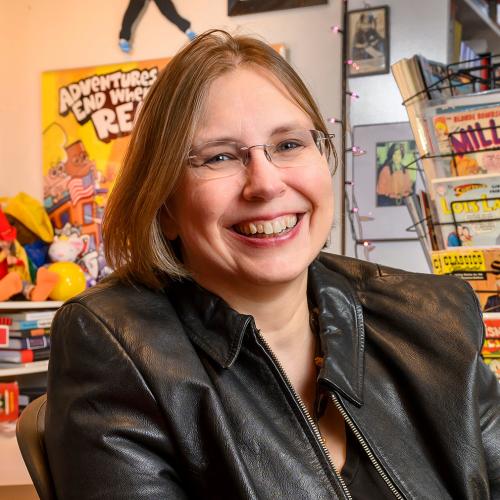Associate professor Carol Tilley on Wonder Woman, public libraries vs. drugstores, and our very visual culture as told to Mary Timmons
I teach graduate students who are going to be working with young people in school and public libraries. This includes a readers' advisory course on helping library patrons of all ages find comic books they might enjoy or find rewarding.
I also teach an undergraduate honors course on comics. Most of the students are studying engineering, science and business. Many of them come in thinking that the class is going to be fun and lighthearted. They're surprised at how the production and distribution of comics have changed, how the industry's economics have changed, and how the representation of certain racial and gender identities have changed, but that there are still these “kernels of ick”—for lack of a better term. These include the hypersexualization of female characters like Power Girl, Catwoman and Wonder Woman, and a tendency to relegate non-white characters to sidekick, background or villainous roles.
When I became a librarian, I started thinking about why, as a kid, I had to go to a drugstore to get some of the things I wanted to read most. It hasn't been until the last 15 years or so that public libraries and school libraries have started collecting comics widely. And we're still working with the prejudices and stereotypes of the 1940s and 1950s that comics are for people who are illiterate or uncultured or unsophisticated.
One of my students alerted me recently that I made an appearance in Cat Kid Comics Club Influencers, the newest Dav Pilkey comic. While the comic doesn't name me, it depicts my archival research on psychiatrist Fredric Wertham.
Wertham was at the head of the anti-comics movement in the U.S. during the late 1940s and early 1950s. He published a book about the dangers of comics called Seduction of the Innocent, and he was a witness at U.S. Senate hearings about comics and juvenile delinquency in 1954. In 2010, his papers were finally made available at the Library of Congress. I went to do research in those papers, and I found that Wertham had done a lot of misrepresentation of what kids had told him. He had done a lot of cherry-picking and fabrication. He also had made up some stuff.
Comics remain successful and relevant because we like to look at pictures. We are a very visual culture. They tell all kinds of stories. They tap into our hopes and dreams as a society. Comics help us to imagine different futures.
Edited and condensed from an interview conducted on Nov. 15, 2023
